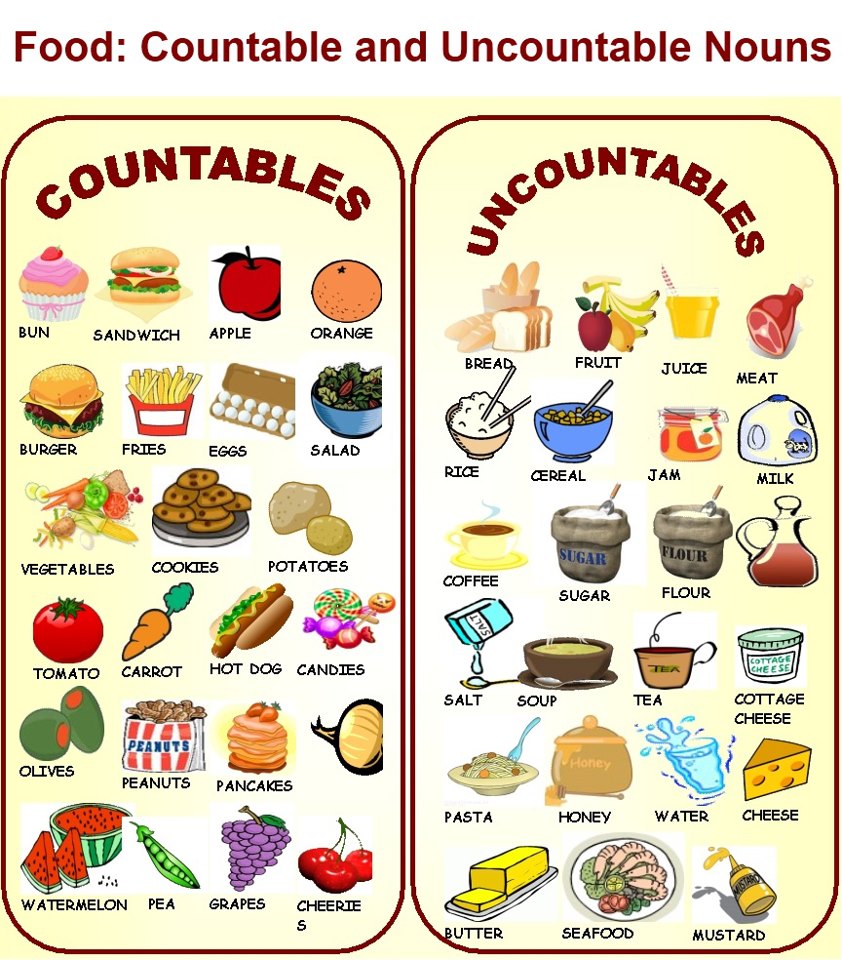1. Countable nouns
Most of the nouns are countable. You can combine them with numbers, e.g one, two or three. Here is an example:
- one pencil
- two pencils
- three pencils
- four ...
2. Uncountable nouns
These nouns cannot be combined with numbers.
- water
- butter
- coal
- money
- salt
- iron
If you want to express a quantity, you have to use a special phrase e.g. a glass of water.
Note:
Some nouns can be either countable or uncountable. We recommend to use a good dictionary to find out whether a noun is countable or uncountable or both.
Here is an example:
hair – hairs
- You've got some hairs on your T-shirt. (There might be 5 or 6 of them.)
- Your hair looks lovely. (Here you think of the hairstyle.)
1. When do we use much and when many?
do we use much and when many?
- much: uncountable nouns (milk, marmalade, money, time etc.)
- many: countable nouns (bottles of milk, jars of marmalade, dollars, minutes etc.)
Examples:
- How much money have you got?
- How many dollars have you got?
In informal English these questions are often answered with a lot of, lots of. There is no much difference between the two phrases.
2. When do we use a little and when a few?
- a little: non countable nouns (milk, marmalade, money, time etc.)
- a few: countable nouns (bottles of milk, jars of marmalade, dollars, minutes etc.)
Examples:
- He has a little money left.
- He has a few dollars left.
When do we use some and when any?
We use some and any for an amount which is not known e.g. Have you got any crisps?
Use of some and any
- some: affirmative statements, offers, requests and in questions when you expect the answer ›yes‹
- any: negative statements, questions
Have you got any bananas? No, we haven't got any. But we've got some oranges.
Exceptions:
I would like to buy fruit at a market. I see the man has wonderful apples so I can ask him:
- Can I have some of these apples?
If I do not see apples or if I am not sure whether there are apples at all I use any in this question.
- Have you got any apples?
When do we use a lot of and when lots of?
These phrases are mainly used in informal English – lots of sounds a bit more informal than a lot of. Both forms are used in singular and in plural sentences.
It is not the phrase a lot of or lots of which determines singular or plural, but the subject of the sentence (herewater and computers).
1. Informal English
Singular
- A lot of water is wasted.
- Lots of water is wasted.
Plural
- A lot of computers are needed at schools.
- Lots of computers are needed at schools.
2. Formal English
In formal English we use plenty of or much and many instead of a lot of/lots of.
Singular
- Plenty of water is wasted.
- Much water is wasted.
Plural
- Plenty of computers are needed at schools.
- Many computers are needed at schools.
No comments:
Post a Comment